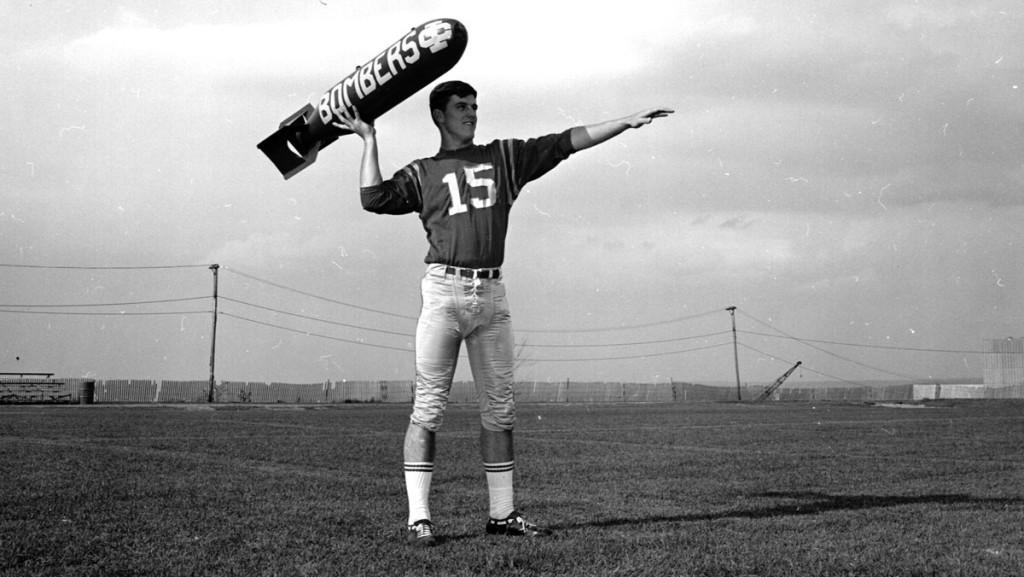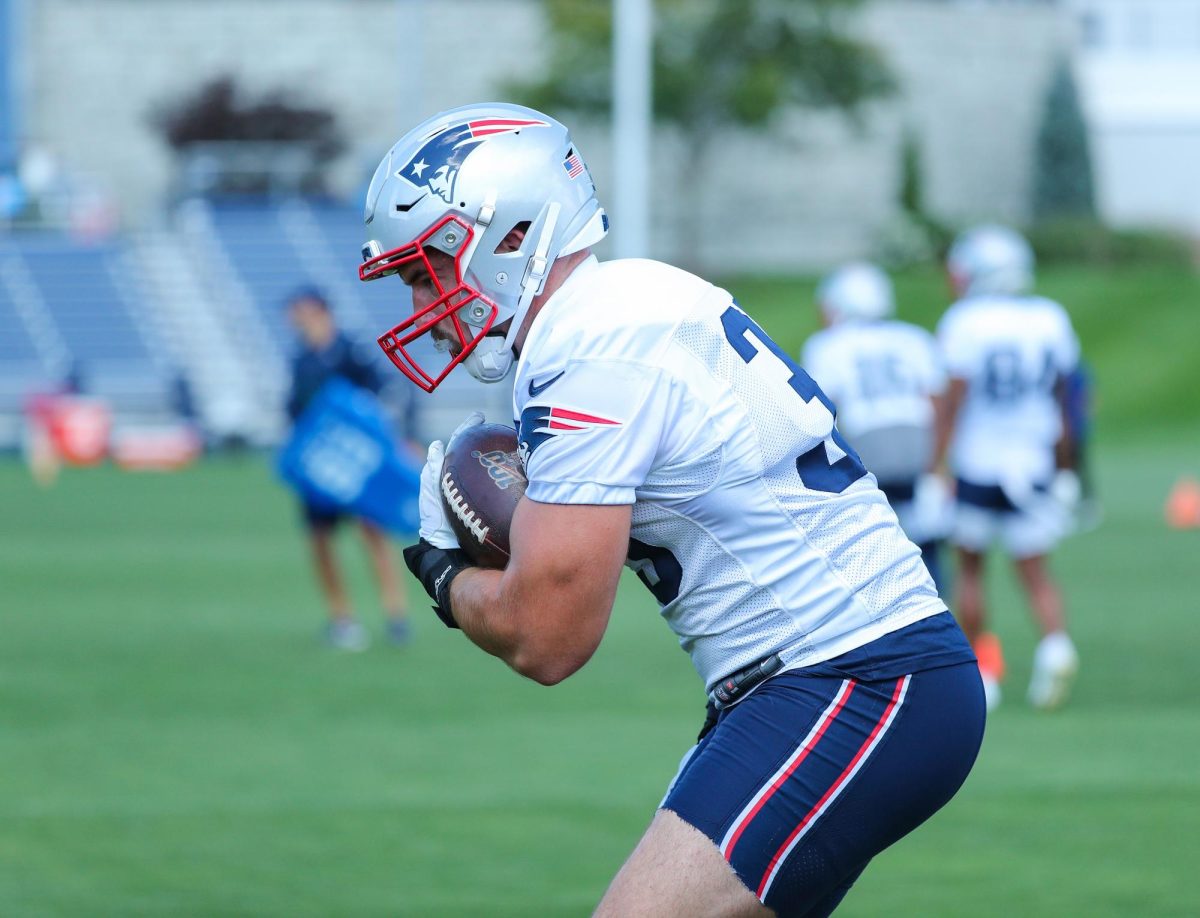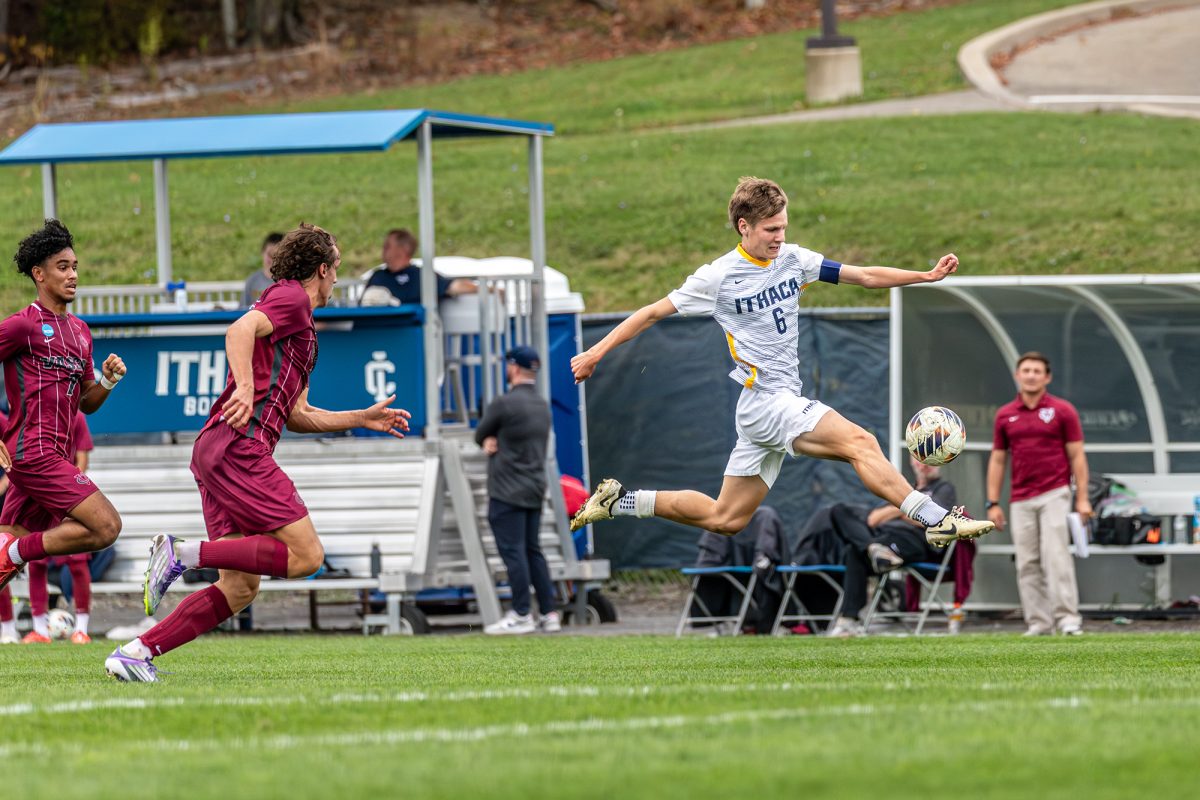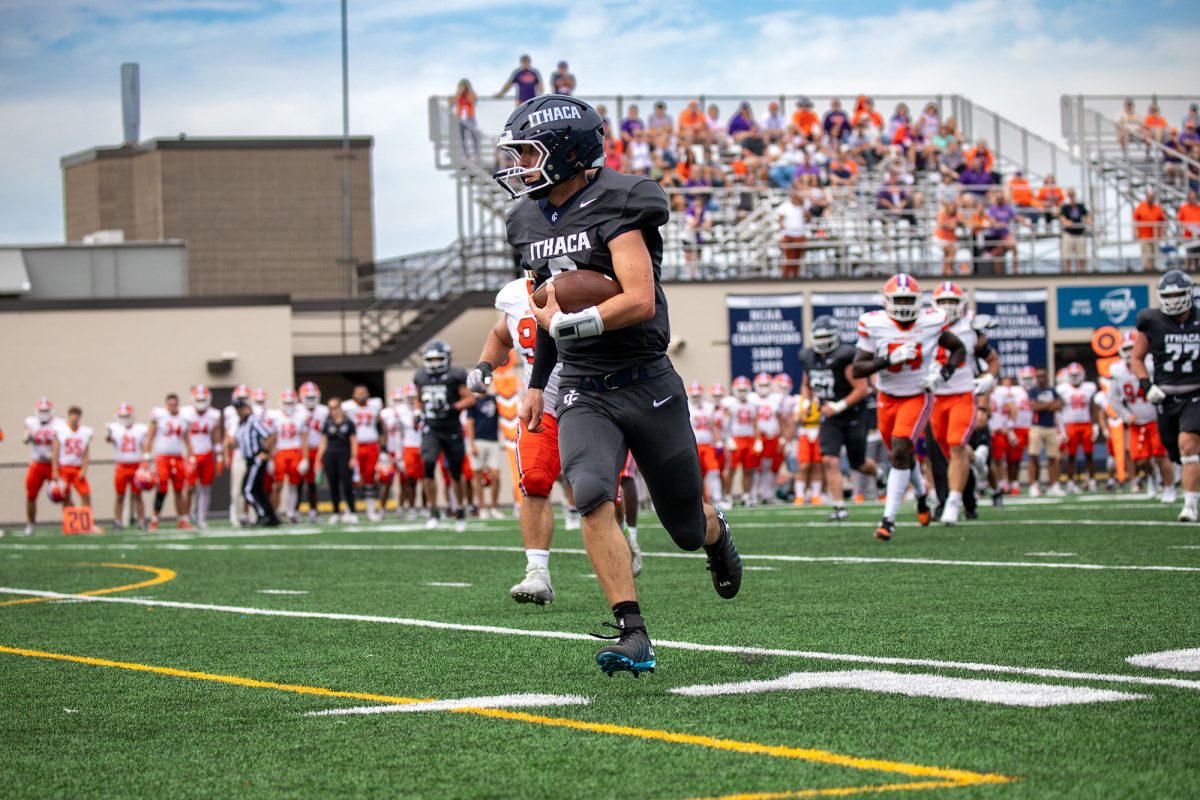It’s a cry heard on any given day on the Ithaca College campus. It’s said by tour guides, students, alumni, faculty and staff alike. Bomber pride and tradition reign in Bomber Nation. The college’s sports teams are said to “bominate” any field, court or track they encounter because that’s the Bomber way.
But where did this all start, and what actually is a Bomber? This, one of the biggest mysteries of the college, has never met a definitive answer. Its origin unknown and its path murky, the Bomber name has existed at the college for decades.
Many have heard stories about the term’s origin. One of the most popular theories attributes the term to a reporter in the ’30s or ’40s who coined the term after the college’s basketball team made a terrific comeback during a game. The reporter talked about the bomb shots the players made from a great distance.
Following that article, as Susan Bassett ’79, director of the Office of Intercollegiate Athletics, said, the name just stuck.
If this theory is true, then that article has gone missing because according to the college’s collection of archived local newspapers, the first article to mention the Bombers, calling them the “Blue Bombers,” referred to the football team. There is some truth to the reporter-generated notion, however, but stories have been changed and lost over the years.
Many believe no one actually knows how the term “Bomber” came about — at least no one today. But from all the confusion, two prominent theories emerge and in some ways overlap to give current Bombers a better understanding of the history of the term, which dates back to the 1930s.
The History: Pre-Bomber
Analyzing the historical context of the college’s nickname is an important part to understanding both of these theories, which date back to around 1936.
Before the mid-’30s, the college’s popular sports teams, which were mainly football, basketball and baseball, went by many names: the Blue and Gold, the Ispies — stemming from an acronym for the Ithaca School of Physical Education at the time — Blue Team, Collegians and the Seneca Streeters, which referenced the gym athletes used on Seneca Street on The Commons.
Clearly, there was no official name for the college teams. On Oct. 16, 1936, The Ithacan conducted a poll and had students vote for a team name. From a list of options, the student body chose to be the Cayugas, which The Ithacan reported Jan. 8, 1937. The 1937 version of the yearbook, “The Cayugan,” reported all sports teams would be called “Cayugas” or “Cayugans,” named for the Native American tribe that inhabited the land before the college.
In his 1983 book “The Ithaca College Story,” former English professor John Harcourt detailed the history of the college. On the subject of the Bombers, Harcourt cites writing by John Mason Potter, former publicity and media relations director at the college. Potter began writing his own history of the college for the 75th anniversary of the school, but the draft was never published.
In his manuscript, “The First Seventyfive,” Potter described how he perceived the generation of the term Bomber. The name “Cayuga” was used for a while but somehow did not stick.
Bridget Bower, librarian and college archivist, said a very low number of the student population actually participated in this vote, and only a small number actually chose “Cayugas.”
Before long, students showed their dissatisfaction with the new name. An article by local reporter Kenny Van Sickle criticized the name “Cayugas” and hinted at the students’ lack of identification with the name in an unidentified newspaper from the library archives dated Jan. 29, 1937.
Here is where the specific origin gets lost. Some event or movement following this decision to be the Cayugas led to the creation of the college teams’ current name.
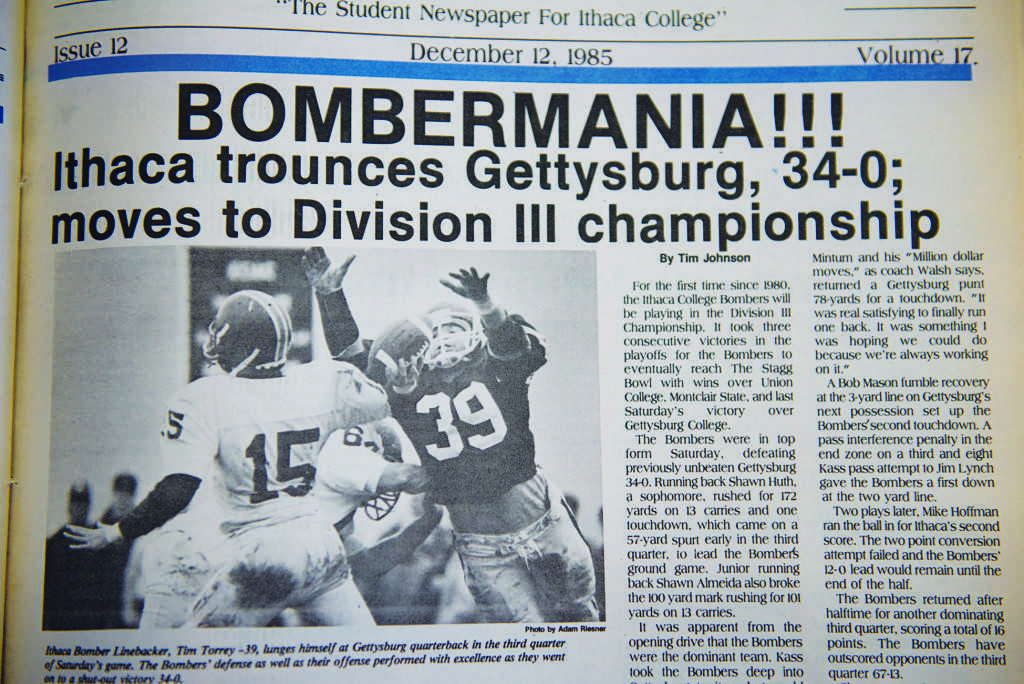
Theory One: The Power of the Press
The first origin theory hypothesizes that “Bombers” began as a reporter-coined term and the use was compounded by a push for the name by students.
Just over a year after Van Sickle’s article, the first press reference to the Bomber occurred March 12, 1938. The Syracuse Journal discussed the college’s upcoming football season and referred to the “Blue Bombers” schedule. This was the first known documented use of the term. Although this occurred outside the college, The Ithacan’s first reference to the Bombers instead of the Cayugas came eight months later on Nov. 23, 1938, reporting on the football team’s final win of the season. This article was immediately followed by an unspecified paper’s reference to the football team as the Bombers on Nov. 24, 1938.
During this time, the sports teams were still referred to by many names, but the term “Bombers” was sprinkled among the articles.
Beginning in 1939, newspapers exploded with use of the term. Regional newspapers, especially the Syracuse Post-Standard, began using the Bomber name more frequently and more exclusively than they ever had before. By the 1940s, the name was established, and the college teams became the Bombers as they are still today.
Bower, who has worked at the college for over 27 years, said it’s hard to determine what the driving force behind the Bomber was.
“It’s really hard to tell who was pushing because the references are so brief and far apart, and after a year, that just became the name of the team,” Bower said.
While these reporter references to the Bombers support the theory that the term was coined by local journalists, other occurrences complicate things and bring in the second origin theory.
Theory Two: Bomber Baseball
The second theory is that the term originated with the college’s baseball team. At a pivotal time in the college’s athletic history, people compared the college team to the New York Yankees, who have been nicknamed the Bronx Bombers. This theory receives support from several archived articles that specifically name the baseball team as “Bombers.”
According to his manuscript, Potter credits Ithaca Journal reporter Harold Jansen with creating the name. Jansen joined the college in 1936 as part-time publicity man who also covered the college’s athletic events for a number of upstate newspapers. Potter said Jansen’s use of the term Bombers in his articles led to the acceptance of the name.
Bower said Jansen was an acquaintance of both Potter and Harcourt and a reporter for the Ithaca Journal in 1939 and the Syracuse Journal before joining the college.
From what the archives show, Jansen was a sports writer who often covered events at the college. Jansen’s articles, which start in late 1938, never used the term Bombers at all in reports on football and basketball. However, as the baseball season started up in the spring of 1939, Jansen begins to reference the Bombers.
For Jansen, “Bombers” was used exclusively for baseball. This supports the second hypothesis, which possibly relates the college’s team with the Yankee ballplayers.
Jansen is the connection between the two theories, but Bower said she discredits the theory that Jansen is the founder of the term.
“The reason I discredit this is that the Jansen story doesn’t add up,” she said. “I’ve looked through thousands of Ithaca Journal articles, and he didn’t use it there. It didn’t show up in the Ithaca Journal until the mid-’40s. Maybe he coined the term, but he didn’t do it in print.”
According to the archives the college possesses, it is true that Jansen was not the first to use the term and therefore did not coin the term himself. However, Jansen certainly created a trend with his usage of the nickname in his articles. It’s possible that as a member of the college, he helped incite the term, but as noted and supported by the first theory, he was not the first to print it.
Unlike Bower, others stand by the notion that the baseball team inspired the nickname. Carlton “Carp” Wood ’39, a respected athlete, coach and Hall of Famer at the college and namesake of Carp Wood soccer field at the college, was also the sports editor for The Ithacan in 1938, the first time “Bombers” was used in the school paper. His son, Dan Wood, was the women’s golf coach at the college from 2008 to 2015. Wood said he had heard stories from his father about the origin of the “Bomber.”
Although his father was a member of the baseball, basketball and soccer teams during his time at the college, Wood said the Bomber legacy began solely in baseball. Wood was sure that the baseball teams of 1938 and 1939 were considered the Bombers, but he was not positive about other sports teams. Based on Wood’s notions and backing evidence, the term Bombers may have originated with the baseball team.
“I think that’s my theory,” he said. “Since baseball was always such a big sport at Ithaca College, and maybe it sort of started with that and spread to all of the teams. I can’t prove that, but I think my father felt that had something to do with that.”
He supports the idea that the term began with the baseball team, consequently sticking and spreading to the other sports, but he also helped bust another theory about the Bomber name that proved to be a myth.
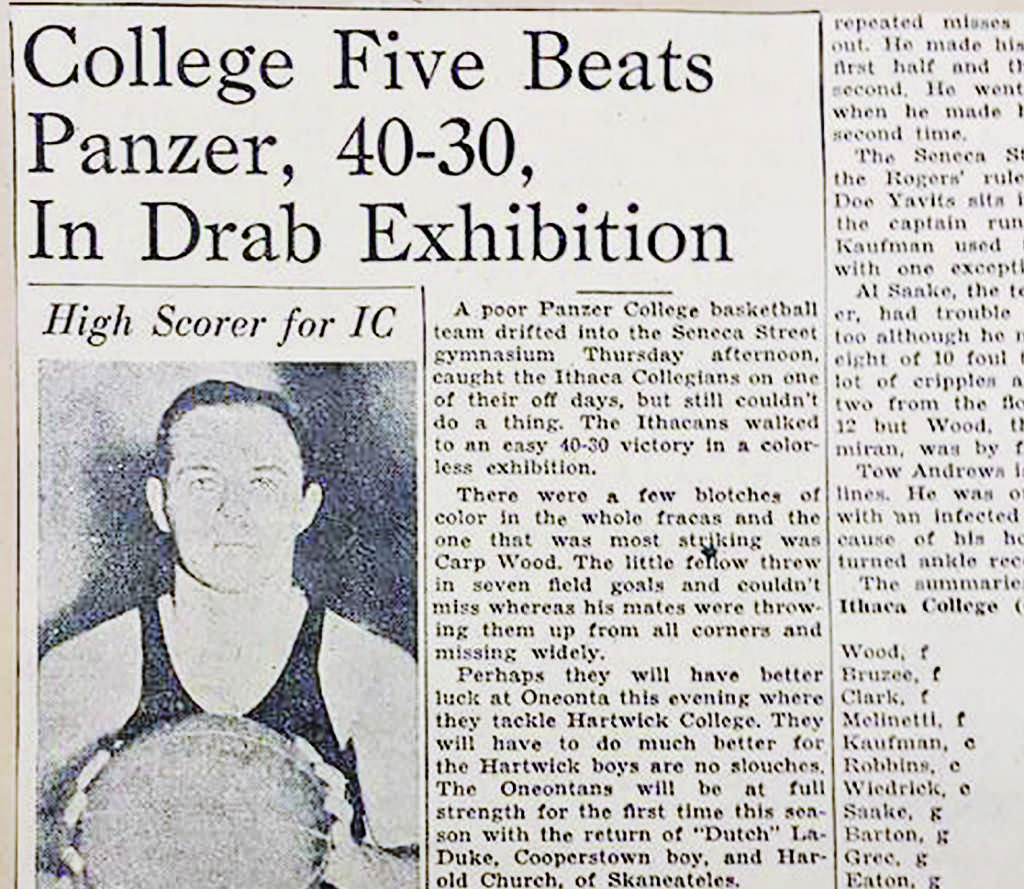
Mascot Search and the Pushback Against the Bomber Name
Wood’s major battle with the Bomber name occurred post 9/11, when some at the college theorized that the “Bomber” was a militant symbol that was inappropriate to be the name of the college’s sports teams. Wood disagreed.
“In all the years I’ve been around Ithaca College and when my father coached there for many years, I never once heard any of his colleagues make a direct connection with military bombing,” Wood said.
Some thought the Bomber had a negative connotation and disliked that students often represented the Bomber with militaristic images. According to alumni, the “Bomber” has made several appearances throughout the “mascotless” years, but there was really no rhyme or reason to the mascots, which included a unicorn and Snoopy the World War I Flying Ace in the ’70s and, most notably, a World War I Bomber pilot throughout the ’80s, ’90s and 2000s.
Ithaca College President Tom Rochon initiated the search for an official school mascot to accompany the Bomber name Nov. 19, 2010, and narrowed down the options from over 250 down to three: the Phoenix, the Lake Beast and the Flying Squirrel.
Following this announcement, many students and alumni expressed dissatisfaction with the mascot search. As a result of this discontent, the administration reconsidered the initiative, even though the majority of students were enthusiastic about the change.
“The minority opposed to having a mascot is large enough and impassioned enough that what began as an initiative to personify Bomber pride instead served as a wedge issue to divide us,” Rochon said in a statement in 2011.
The school called off the mascot search and upheld the athletes themselves as the sole personification of the Bomber.
During the mascot controversy when many people criticized the name Bomber because of its aggressive, warlike connotation, Wood, who was coaching during this time, stepped up to defend the origin of the name as his father had known it. Wood gave a speech to coaches and other personnel during this time about the history and importance of the term, citing his father’s articles from 1938 and 1939 that predated wartime and included the term “Bombers.”
“I told them, ‘You all know the New York Yankees were referred to as the Bronx Bombers,’” he said. “I wasn’t around in 1938 and ’39, but my father led me to believe that the Bomber name was more like how they called the Yankees the Bronx Bombers, which certainly predated World War II.”
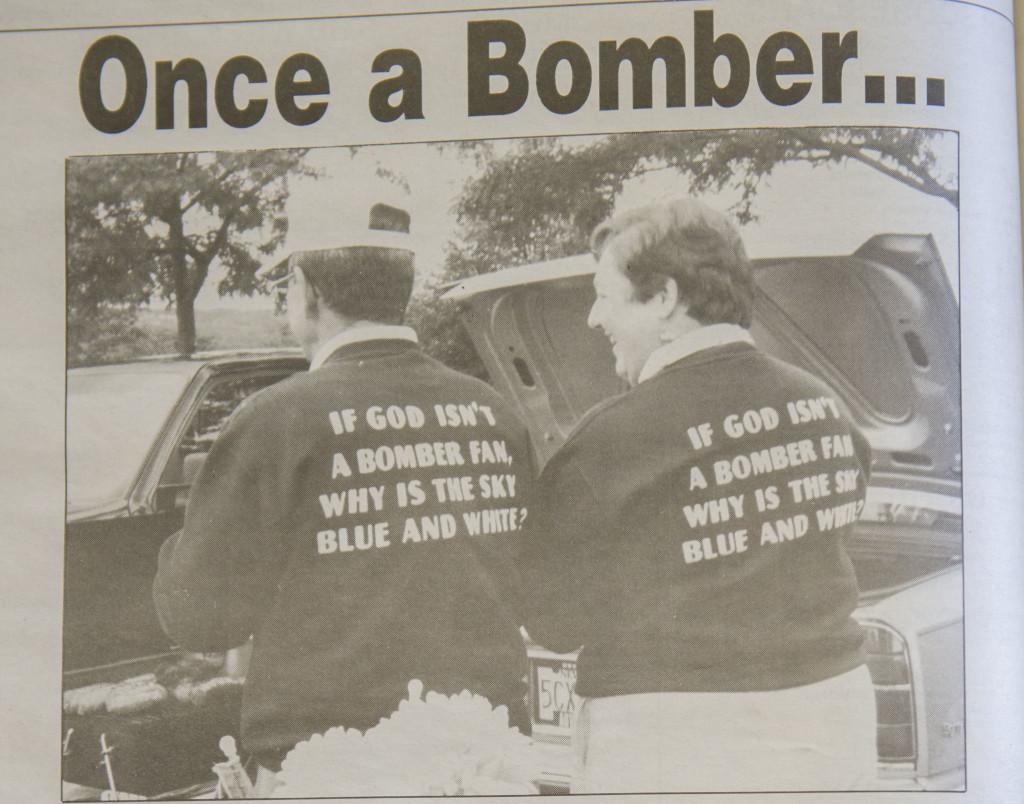
From Then to Now
Since the Bomber nickname became official, Bower said, there has been a movement about every six or seven years to change the name, connotation or mascot for the Bombers. None has been successful, as the college remains the Bombers.
Today, the term is free from militaristic connotations and instead creates a collective identity exclusive to the college. Bower said that the only other team named “Bombers” is a softball team in Idaho. She said alumni have responded positively to the name over the years.
“We have a high percentage of students and alumni now who are really attached to the brand,” Bower said. “They consider themselves Bombers. It’s that team spirit and team togetherness.”
Bassett competed on the field hockey and swimming teams for the college from 1975–79. She said sports teams throughout the history of the college as well as current students consider themselves Bombers and adopt the name as part of their identities.
“I think any nickname is part of the identity and part of how a school thinks of itself,” she said. “Every college team has a name universal for all their sports. The meaning now for Ithaca College is around our history and tradition. We’ve been successful, so our alumni have an affection for that name. They say things like ‘my beloved Bombers.’”
The entire truth about the term’s origin may never be fully clear. The answers lie in the murky time period between winter 1937 and the spring of the following year. Whether the term was coined by an inspired reporter or a comparison to the Bronx Bombers or by a student or a coach of the time, there are many hints to the term’s origin. Quite possibly, the truth arises from a combination of all of the theories. Although its history is complicated, the term Bomber now has a home at the college.
Bassett said the name now brings Bombers from all over the college together.
“Within the school, particularly within the athletic department, it provides a unity because you might be a women’s basketball player or a baseball player or a gymnast, but you’re all Bombers,” Bassett said. “You’re all part of that family.”
This article has been updated to correct two errors. The militaristic perception of the Bomber name is not attributed to Ithaca College President Tom Rochon, and the unofficial Bomber mascot in the ’80s, ’90s and 2000s was a WWI pilot, not a WWII pilot.


